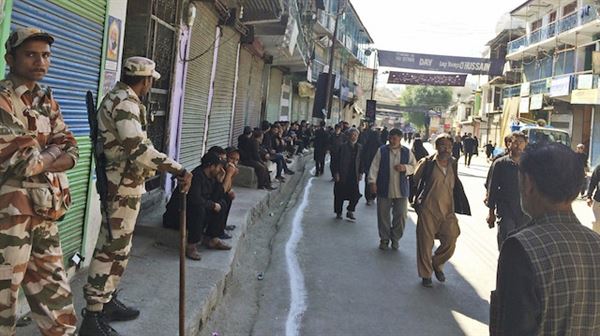The constitutional changes approved by the Indian parliament on Aug. 5 revoking autonomy and separate citizenship law for Indian-administered Jammu an
The constitutional changes approved by the Indian parliament on Aug. 5 revoking autonomy and separate citizenship law for Indian-administered Jammu and Kashmir, are set to become operational on Oct. 31, a watershed moment to change the region forever.
From Thursday onwards, the region will be divided into union territories of Jammu and Kashmir and Ladakh, administered by two lieutenant governors Girish Chandra Murmu and Radha Krishna Mathur, respectively.
The office of governor, the highest executive authority, stands reduced to lieutenant governor, who will report to the Indian home secretary based in New Delhi.
The union territory of Jammu and Kashmir will have two divisions; Kashmir Valley and Jammu, an area of over 42,000 square kilometers (16,216 square miles) with a population of 12.26 million, which comprises 8.44 million (68.8%) Muslims.
The vast territory of Ladakh, also known as the cold desert, spread over 59,000 sq km (22,780 sq mi) and comprising two districts of Kargil and Leh, houses a tiny population of 274,289. Out of this, Muslims make up 127,296 (46.4%) and Buddhists 108,761 (39.65%).
While Jammu and Kashmir will have an elected assembly with truncated powers, there will be no elected legislature for Ladakh. The upper house of the assembly also ceases to exist. The region no longer will have its own constitution or flag.
All laws passed by the Indian parliament will be applicable in the region. The Indian Penal Code will replace the local Ranbir Penal Code of Jammu and Kashmir to decide criminal cases.
Earlier, India’s federal government controlled foreign affairs, defense, finance and communications — but left other governance matters to provincial representatives.
The separate citizenship law under Article 35 (A) of the Indian constitution stands null and void. Any Indian citizen from any part of the country can now buy property in Jammu and Kashmir, take a state government job and enjoy scholarships and other government benefits. Children of a woman marrying outside Jammu and Kashmir will not lose property rights.
153 laws, 6 commissions stand repealed
Advocate Muhammad Ishaq Qadri, a former public prosecutor in Kashmir, told Anadolu Agency that people in Jammu and Kashmir under local education law were enjoying free education from primary to university. The law ceases to exist now.
Former Advocate General Jahangir Iqbal said that at least 153 laws approved by the Jammu and Kashmir legislature stand repealed from Thursday. Ironically, one of the most hated provisions Jammu and Kashmir Public Safety Act 1978 that stipulates detaining people without judicial proceedings has not been repealed.
The region’s own employment cadre, Kashmir Administrative Service will be now open for Indian citizens to compete. “The new recruitment will be held under laws applicable to centrally administered territories of India. An employee working in Kashmir can be now transferred to any other far off centrally administered region,” Iqbal said.
The Indian Administrative Services officers, who come from other Indian states, even after serving in Jammu and Kashmir until their retirement were not entitled to buy a property.
The new arrangement comes as a boost for security forces, who for setting their base and camps had to go through a maze of legal wrangles to acquire land. “Any central agency [including security forces] can come and apply to get land,” he said.
There is no clarity as yet, about the official language of the region. Under the now-scrapped Jammu and Kashmir constitution, Urdu was the official language of the region. But the Indian constitution recognizes Hindi as the official language.
Six commissions that included Human Rights, Information, Consumer Disputes Redressal, Electricity Regulatory, Protection of Women and Child Rights, Persons with Disabilities and State Accountability cease to exist.
New arrangement to bring prosperity, says India
India’s argument is that the new arrangement will boost the economy of the region by integrating it with the rest of the country.
According to a document issued by Indian Home Ministry, the private industries, which were not able to establish units for want of acquiring land, will now set up manufacturing units and attend to the issue of unemployment.
“The issue [not providing land to outside industrialists] had led to unemployment in youths. This unemployment was giving them enough time to take part in activities like stone pelting and separatism movement,” the document added.
It further argued that social amalgamation will reduce the threat of militancy and predicted Kashmir to become one of the top tourist destinations after complete development.
“It [new arrangement] will also prove to be good diplomacy to deal with Pakistan over territorial disputes. It will politically give chance to all parties to rule the state and allow its development,” argued the ministry document, explaining the rationale behind the scraping of autonomy to Jammu and Kashmir.
A five-judge constitution bench of the Indian Supreme Court is currently hearing the legal validity of Prime Minister Narendra Modi government’s decision for revoking the special status.
On Aug. 28, Chief Justice of India Ranjan Gogoi set up the constitutional bench of justices N V Ramana, S K Kaul, R Subhash Reddy, B R Gavai and Surya Kant to commence hearing on a batch of petitions challenging the scrapping of provisions of Article 370 of the constitution, which secured the special status of the region.
Kashmir, a Muslim-majority Himalayan region, is held by India and Pakistan in parts and claimed by both in full. A small sliver of Kashmir is also held by China.
Since they were partitioned in 1947, the two countries have fought two wars over Kashmir.
Some Kashmiri groups in Jammu and Kashmir have been fighting against Indian rule for independence, or for unification with neighboring Pakistan.
According to several human rights organizations, thousands of people have reportedly been killed in the conflict in the region since 1989.
